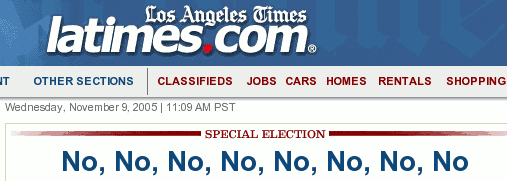Note to self: Stick with morning voting next time.
“Oh, it’s only a midterm election! How crowded could it be?” (Yes, that was me.)
Feh.
Katie and I arrived at the polling place at 6:30 PM. The people who got in line behind us decided to leave, have dinner, and come back. Of the two of us, she voted first. I walked out of the voting booth at 7:58 PM.
It wasn’t as bad as the last time we voted in the evening, which was either the 2003 recall election or the 2004 presidential election. That time we were still in line at 8:00, and they made the cut-off anyone who was in line by 8 PM. IIRC the local Starbucks had actually sent over free coffee for people waiting in line.
But it was a far cry from last November, when we arrived and only one person was in line ahead of us.
